
The Dramatist Poet: A David Mamet Interview
September 6th, 2004
"There's no such thing as talent; you just have to work hard enough." -- David Mamet
(Interview first appeared in Screenwriter's Monthly)
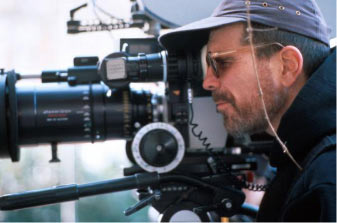
David Mamet is one of the greatest writers working today, if not ever, so any chance to sit down with him was an honor. I joined a roundtable interview where several journalists had the chance to ask Mamet questions. Fortunately, just about everything he said was relevant, so here is the interview in its entirety.
Mamet wears huge yellow glasses and sports a full beard, so when he gets into long speeches about the use of exposition, he feels totally professorial. Even when he dishes short quips about dialogue, it’s so pointed it feels like he’s prepared the answer for years. Probably, he has. Having been in the screenwriting/playwriting business for so long, he must have been asked all these questions many times before.
The film Mamet is promoting is his latest, Spartan, an action-thriller about a military investigator (Val Kilmer) trying to locate the president’s kidnapped daughter. When the case hits a premature end, he realizes the conspiracy actually goes deeper than he imagined. Though some elements may seem like the typical motions of an action movie, it has the Mamet twist of sharp, stagey dialogue and an atypical sequence of twists and turns.
Do actors usually get your dialogue or do you have to coach them? No, they get it. I write it to be spoken, and I think that almost all actors appreciate that.
How many passes does it take to create perfect dialogue? That’s a really good question. I’m not sure I know the answer. I do it fairly spontaneously, and then sometimes, for various reasons, it has to be recrafted. I used to be really good at that, but it gets more difficult as I get older just because my brain is failing. I have less brain cells because long before any of you guys were born, there was something called the ‘60s. That’s where the brain cells were.
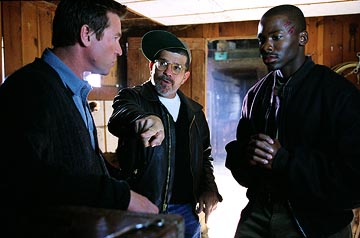
What’s your writing regimen? I think I’m going to just start writing and keep writing until they throw me in jail. Other than that, I set aside all day every day for writing and break it up with going home to see my family or having lunch or getting a haircut. I hate to do that stuff, but85
Is writing a screenplay or stage play easier? It would seem that you could do almost anything on film, but that’s part of the wonderful fascination of filmmaking. You say, well, okay, you can do anything you want. Now, what are you going to do? So that’s the wonderful challenge of film. Theoretically, I can do anything I want, limited only by my ability to express it in terms of the shot list. So that’s a fascinating challenge. So I don’t find it any more freeing or any more constrictive than writing plays. They each have their own strictures. The wisdom of how to understand those strictures fascinates me.
What are the strictures of playwriting? Aristotle said it’s got to be about one thing. It’ll be one character doing one thing in the space of three days in one place, such that every aspect of the play is a journey of the character toward recognition of the situation. And at the end of recognizing the situation, he or she recognizes the situation, undergoes a transformation, the high becomes low, or in comedy, sometimes the low becomes high. That’s the stricture of playwriting.
How did you approach Spartan? I just started writing it and kept writing, and it evolved and evolved. It’s like filling in a crossword puzzle. You know that word has got to be abracadabra, right? Because there’s no other word it can be until you get halfway through and you see that the word down the middle has a P in the middle of abracadabra and there is no P. So therefore, one of them has to be wrong. They can’t both be right. And the same thing is true about structuring a drama. You go along and say, �I know this has got to happen at the end of the second act,� until you realize you’ve spent two years, and it doesn’t work. So something’s wrong. Either the first and third acts are wrong or the second act is wrong. How am I going to fix it? The structure is the whole thing � getting the movie to eat up 15 lines on a sheet of paper so you can write it.
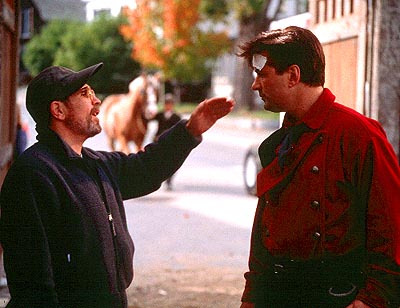
How do you make a genre film your own? Well, you can’t help but make a distinct movie. If you give yourself up to the form, it’s going to be distinctively your own because the form’s going to tell you what’s needed. That’s one of the great things I find about working in drama is you’re always learning from the form. You’re always getting humbled by it. It’s exactly like analyzing a dream. You’re trying to analyze your dreams. You say, �I know what that means; I know exactly what that means; why am I still unsettled?� You say, �Let me look a little harder at this little thing over here. But that’s not important; that’s not important; that’s not important. The part where I kill the monster � that’s the important part, and I know that means my father this and da da da da da. But what about this little part over here about the bunny rabbit? Why is the bunny rabbit hopping across the thing? Oh, that’s not important; that’s not important.� Making up a drama is almost exactly analogous to analyzing your dreams. That understanding that you cleanse just like the heroes cleanse not from your ability to manipulate the material but from your ability to understand the material. It’s really humbling, just like when you finally have to look at what that little bunny means. There’s a reason why your mind didn’t want to see that. There’s a reason why you say, �Oh, that’s just interstitial material. Fuck that. That’s nothing, right?� Because that’s always where the truth lies, it’s going to tell you how to reformulate the puzzle.
What’s the bunny rabbit in this movie? Part of the bunny rabbit in Spartan is what does he do in the second act? He finds out that everything is screwed up, and it’s not a question of manipulation. I better get on my white horse and ride off in all directions, but the question is what am I going to do? So the first thing he does is he says, �I’m going to get everything to the first lady, because she’s the mommy. She’ll solve the problem.� He finds out that he’s failed. He was so intent on trying to get to the mother of the victim that he overlooks the fact that he’s just gotten trapped. This woman doesn’t look like she’s the secret service but she is, and then it turns out that that wisdom there leads him to where does he go then? First he goes to the young girl and says, �Here’s the story. Can you help me; can you help me?�And what she says is, �All I’m going to tell you is what you told me in the first reel, right?� He doesn’t like that, so he’s going to get out of it by going to the mother. He goes to the mother first, and she says, �There’s nobody there but you; therenobody there but you. Everything you wanted to avail yourself of isn’t there. There is no government. The government’s trying to kill you. There isn’t any unit cohesion. The unit’s trying to kill you. There isn’t any sense of patriotism. Your country’s trying to kill you. Everybody wants you dead. You have to save her.� The woman says, �You have to save her because there’s nobody but you. It’s just your responsibility.� And then he goes to his friend, Tia Texada, and says, �What am I going to do?� She tells him the same thing, �There’s nobody there but you.� So he says, �I’d better go do it. Let me go back and avail myself of one of my other allies.� And the other ally says, �I’m not even going to help you. There’s nobody there but you.� She offers him an out as we find that friends often do when we’re in the midst of a moral dilemma. We go talk to our friends, right? One of our friends always says, �Listen, I understand that you wanna do what you think is the right thing, but that’s really not the right thing here, and let me tell you why.� It does you a credit that you said you want to do the right thing, but the really righter thing would be to do the wrong thing. And the question is, having had the problem restated to him, having understood what the problem is and having had the problem restated to him, he’s now given an out. What’s he going to do? That’s when he has to make a decision that starts to get into the third act. As in any dramatic structure, the third act is really just a reiteration of the first act where the terms are clarified.
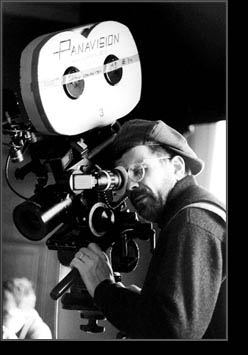
So personal responsibility is the bunny rabbit? Yeah, maybe that’s the bunny rabbit.
How did you keep the exposition to a minimum? That’s the fun of it. Anybody can write a script that has �Jim, how were things since you were elected governor of Minnesota? How’s your albino daughter?� �As of course you know, Mr. Smith, your son has myopia. It’s amazing that, having that myopia, he was winning the national spelling bee.� That’s easy; that’s not challenging. The trick is to take a story that might be complex and make it simple enough that people will want to catch up with it rather than stopping them and explaining to them why they should be interested because then they might understand, but they won’t care. What makes them interested is to make them catch up. What’s happening here? Who is this guy? What crime was committed? Who was taken? Why is she important? Why are all these government people running around? And how is he going to get her back? They want to see what he’s going to do next. That’s all that moviemaking comes down to � what happens next?
How do you not become lost in power? That’s a very good question. I think the answer is that you have to have the specter in front of you all the time. You have to be able to learn, and I think I’m capable of doing this to a certain extent, and I would like to be able to do it to a greater extent, to say that you have to be able to take pride in mastering your own impulses, take pleasure in gratifying them. There are a lot of really great models, and the military is one of them. I think this is a very pro-military movie in many ways. It’s saying, Here are people who are capable of subordinating their financial needs and their physical needs to an extraordinary regiment, mental and physical regiment, in the cause of service. The question of the movie is, �To what extent is that person capable of abiding by precepts which he’s teaching other students, which he’s explained to others?�
Do actors like Val Kilmer respect your dialogue and not try to change it? Yeah, they don’t do that to me because of several reasons. One is the dialogue is good; the other reason is the actor is good.
Have you ever deviated from your own script?
I haven’t deviated from it. I’ve certainly changed it.
In what circumstances?
Well, if something’s not working, a lot of the times you say, �Well, let’s try something else.� I mean, I’ve always got a typewriter in the trailer. Say, �You know, that scene isn’t working right. Give me a moment, I’ll write a new scene.�
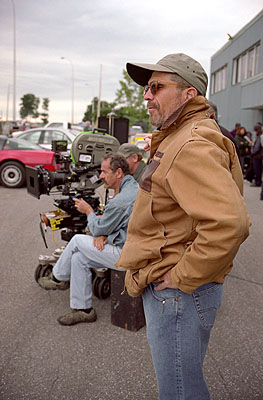
You get inspired too. Oftentimes, you just get inspired. Stuff’s happening on the set. You say, �Oh my God, let’s do some more of that,� or, �Now I understand what happens in scene 47. One of my favorite moments was doing State and Main with Alec Baldwin and Julia Stiles. They’re both drunk out of their minds, and he crashes the car. The car is upside down; they’re both drunk, and he crawls out of the car and looks around. He says, �Well, that happened.� It was like an inspiration at four o’clock in the morning. He said something else, and I said, �Well, wait a second, say this.� I was looking at what was happening on the set and said, �Wouldn’t that be funnier?�
Has an actor ever invented a brilliant line that you took credit for? No, I would never take credit for something somebody else said.
But in a play, you wouldn’t change what’s written. Well, of course, when it’s written. I mean, I just opened a play in San Francisco on Saturday, and I’m changing the play up until opening night, and that’s the first production. I’ll probably change some things as I work on the manuscript before it gets published. At a certain point you’ve got to stop.
What have been the greatest frustrations of letting other people direct your scripts? Well, the greatest frustrations have been having the scripts directed other than the ways in which I thought they would have gone. But when I did a script for someone else to direct, I got paid for it. I mean, that’s one of the things you get paid for.
Something as well regarded as Glengarry Glen Ross � what would you have changed? Oh, nothing. I wouldn’t have changed anything. I love that one.
When do you make yourself stop writing? I’m pretty good. At a certain point you want to do something else. Past a certain point, you say it could be perhaps a little bit better with a lot more time, but I try to get it as perfect as I can given the fallibility of the fact I’m not going to live forever.
How do you approach something that’s your own as opposed to a for hire project? I don’t think I approach them any differently. I put my name on it. That’s the best I know at this time.
Do you see a career plan? I don’t know. I just make them up as I go along. Whatever anybody says, you’re always making it up as you go along. It’s like when you have babies; nobody gives you a how to book; nobody gives you a manual. It’s like any of the important things in life. Whether it’s your career, whether it’s marriage, whether it’s child rearing, you’re making it up as you go along. And you try to have certain precepts, and sometimes they even change.
Has directing become as natural as writing? Well, I enjoy it. There are certain things I can do naturally, but the people a lot of us admire � I’m sure a lot of athletes that people admire � they’re working on their weaknesses all the time. That’s what I’m doing at least some of the time. So do you enjoy doing the thing that goes easy? Yeah, sure. But there’s also great enjoyment in doing the thing that comes with difficulty.
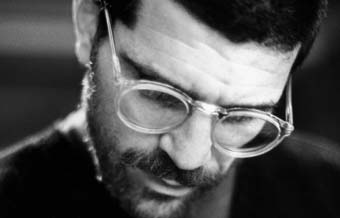
Directing is more of a challenge? Well, certain aspects of the writing are easy. I write dialogue fairly easily. Plot is a big pain in the ass. I work very, very hard on that, but I enjoy working on it because it has great rewards. And I love directing.
When you sit with your plot, do you start with character, theme or story elements? I think when you’re working on the plot, you’re talking about what does the character want? All the plot is is the structure of the main character towards the achievement of one goal. - FT
More recent articles in Interviews
Only logged-in members can comment. You can log in or join today for free!
No comments posted.
Advertisement

















